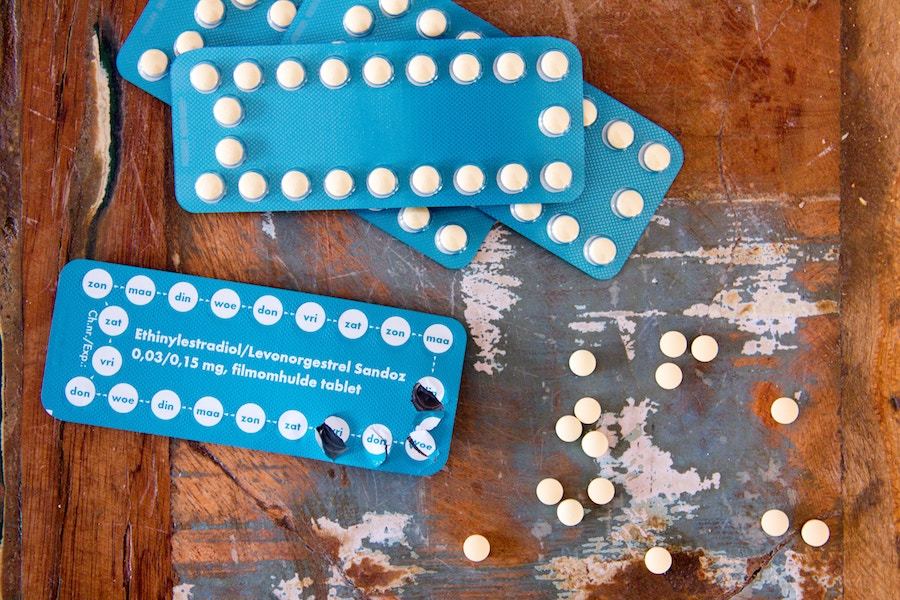Does Birth Control Help with Hair Growth?

Almost every woman has tried or thought about taking birth control pills, and an estimated 26% of women use them as their preferred method of pregnancy prevention. But the birth control pill can do so much more than just prevent pregnancy. They can balance the hormones which can give you beautiful, shiny hair, and flawless skin, or they can cause side effects such as hair loss and acne. The answer to does birth control help with hair growth depends very much on the type of birth control pill, and your own personal medical history.
What Are Birth Control Pills?
Birth Control pills are a hormone based pill that prevent pregnancy. They can work in different ways, contain different hormones, and need to be taken on a different schedule, depending on the pill you use. Essentially, there’s two main types of birth control pills – combination pills and the ‘minipill’.
Combination Pill
Combination birth control pills are a combination of two hormones, estrogen and progestin. Some combination pills are monophasic, which means that they contain equal amounts of both hormones. Others are multiphasic which means that the amounts of the hormones vary.
The combination pills prevent pregnancy in three ways. First, they suppress ovulation to stop the ovaries from releasing an egg. The second line of defence is that they thicken the cervical mucus, which helps prevent any sperm from reaching an egg, if one was released. Lastly, they thin the lining of the uterus, so that if an egg was fertilized, it can not implant on the uterus wall.
The combination pill can be taken in a number of different ways depending on the type you have been prescribed. Some pills are known as conventional pills. These pill packs either have 21 active pills, with 7 inactive pills, or they have 24 active pills with 4 inactive pills. Other pills are known as extended cycle combination pill, where the pack has 84 active pills, and 7 inactive pills, or all the pills in the pack are active pills.
Minipill
The minipill is a contains only one hormone, progestin. The minipill can be more suitable for some women that the combination pill, if for example, they have other health conditions.
The minipill works in much the same way as the combination pill. It suppresses ovulation so that the ovary doesn’t release an egg. It thickens the cervical mucus to prevent sperm from reaching the egg, and it thins the uterine lining to prevent implantation.
There aren’t as many options in the minipill. It has one hormone, and all the pills in the pack are active.
Birth Control Pills And Hair Loss
Some birth control pills can cause the hair to thin, or cause you to lose hair. This tends to be more common in women who have a family history of baldness, or women who are hormone sensitive.
Hair grows in three cycles – the active stage, the transitional stage, and the resting stage.
Active Stage Of Hair Growth
The active stage of hair growth is also known as the anagen stage. This is when the hair is actively growing from the follicle. This stage can last anywhere from two to five years.
Transitional Stage Of Hair Growth
The transitional stage of hair growth is known as the catagen stage. In this stage, the hair growth stops completely. This stage can last for 10 to 20 days.
Resting Stage Of Hair Growth
The resting stage of hair growth is known as the telogen stage. The hair doesn’t grow at all in this stage, and you can lose 25 to 100 hairs per day. This stage can last for up to 100 days.
The birth control pill can cause the hair to move through the stages of growth faster than normal, and can cause the hair to delay at the resting stage. This both inhibits normal hair growth, and encourages hair to fall out faster, and in greater volume than it would do normally.
If you have a family history of hair loss, or if you are sensitive to hormones, let your doctor know, as they can then look for the right birth control pill for you.
Birth Control Pills and Hair Growth
Some pills can actually prevent hair loss. Some hair loss can be caused by high levels of androgens, or male hormones like testosterone, in the body. This can result in a male pattern baldness, and hair loss. Birth control pill can bring the hormones into balance, which will reduce the amount of hair loss. The pill may need to be taken with other medications to achieve hormonal balance if you have hirsutism or PCOS.
Other Benefits Of Birth Control Pills
Women with PCOS or hirsutism can find that birth control pills offer other benefits:
- Birth control pills can help balance the hormones and regulate the menstrual cycle.
- They can help reduce the appearance of other symptoms of PCOS, such as hirsutism.
- Birth control pills may help ease severe menstrual cramps. A long term study published in 2012 found that many women who suffer from severe, debilitating cramps found that these eased and became bearable while taking the pill.
- It may help women who suffer from endometriosis. Endometriosis can cause the uterine lining to attach itself to the fallopian tubes, and ovaries, which can lead to long term fertility issues. Birth control pills can reduce the amount of uterine build-up, and prevent the lining from attaching to the surrounding organs.
- There is some evidence to suggest that taking the combined pill can reduce your risk of some cancers.
If you have questions about the birth control pill, it’s efficacy, effect on hair loss and hair growth, or how and when to take it, ask your doctor or healthcare professional.
